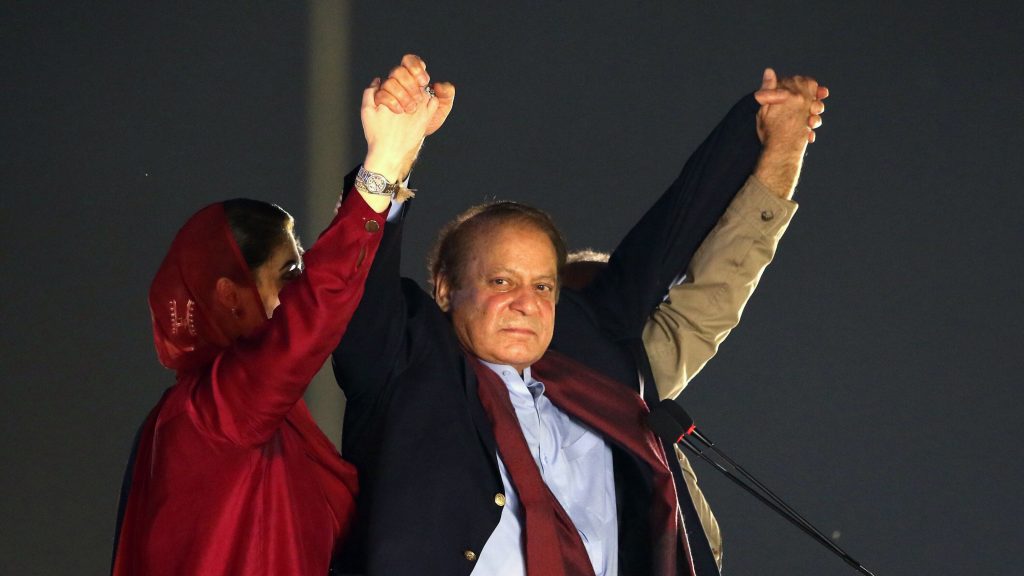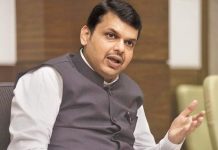
While chances of Sharif’s return to power look bright, it would be difficult to discount Imran Khan, who enjoys a wide popular support. However performance of his party, the PTI, will depend on several factors, most significant of which will be fairness of election process., writes Riyaz Wani
Former Pakistan prime minister Nawaz Sharif’s return to Pakistan on October 21 from his voluntary exile and his unprecedented welcome has introduced a new factor in Pakistan’s politics. Sharif has arrived in the run up to the national polls in Kashmir which are set to be held by January next year and as things stand he could very well be the new prime minister of Pakistan. His job has been made easier by the fact that the former Pakistan prime minister Imran Khan continues to remain behind the bars, and seems unlikely to be released until after the elections are held. Sharif’s return was further facilitated by the bail a Pakistani court granted him two days before his arrival.
But a massive rally at Minar-e-Pakistan in Lahore has put at rest the speculations that Sharif’s charisma may have faded and is a testament to a politician’s ability to reinvent himself. However, his popularity will be further tested in the weeks and months to come. It also remains to be seen whether the alliance among the opposition parties, more so between Sharif’s PML(N) and the PPP, will hold. That is, should Sharif emerge as the dominant player on the scene. And he might, considering he is re-entering the fray after four years, giving his presence a certain novelty.
Besides, Sharif’s return shows that his chequered relationship with the Army has improved, clearing the decks for his return to power should his party do well in the upcoming polls. But then it would be premature to write a political obituary of jailed Imran Khan. After his loss of power following the successful no-confidence motion against his government in 2022, Khan’s PTI emerged as a party with overwhelming support in Pakistan. That is until the Army stepped in and took control. Khan has since been sent to jail where he may continue to languish indefinitely. Besides, jailing of the other major leaders of his party and the crackdown on his supporters has curtailed PTI’s activities. The situation is now such that even while Khan may be enjoying a purported unprecedented public support, it doesn’t matter. What matters is that the Pakistani Army is no longer invested in him. And so it has ensured that Khan’s alleged public support comes to nought.
Would Sharif’s potential return to power make any redeeming difference in Pakistan? It seems unlikely. In the case of Pakistan, the saying that “more things change, more they remain the same,” seems an absolute fit. One more hybrid government experiment that combines democratic and Army rule is a recipe for the same outcome as that of the one Khan’s PTI was party to.
But with Sharif in the saddle there can be hope for improvement in relations with India. The Sharif family is generally seen as friendly towards India and there is hope that a PMLN-headed government could take steps to restore some kind of a relationship with India. When Prime Minister Narendra Modi was sworn in 2014, Nawaz Sharif was among the invited regional leaders who visited India for the ceremony. And later in 2015, Modi had made an impromptu visit to Lahore to attend the wedding of Sharif’s grand-daughter. But the bonhomie between the two countries was cut short when the militants traced to Pakistan attacked an Army base in Pathankot. From thereon, the relationship went steadily downhill reaching its nadir when New Delhi abrogated Article 370 of constitution in August 2019.
The neighbours tried to pick up the pieces with the surprise re-affirmation of the 2003 ceasefire along the Line of Control in February 2021. Ever since, however, they have failed to build upon the truce and restore the dialogue process between them.
Besides, the dialogue faces the main sticking points of ‘Kashmir’ and ‘terrorism’. This makes the conditions for engagement between the neighbours irreconcilable. Pakistan wants to place Kashmir at the front and centre of its dialogue with New Delhi which is unacceptable to the Modi-led government. Pakistan also wants India to restore Article 370 that granted J&K its semi-autonomous status within India which again India sees as irreversible. The unmistakable signal to Pakistan is to temper its expectation about the extent to which India can accommodate it on Kashmir.
But New Delhi wants Pakistan to take steps to end support for terrorism and nurturing militant groups which Pakistan denies doing. So, the situation has become much more complex than it was previously. Sharif, however, could certainly be expected to reach out. Speaking at the rally soon after his arrival, Sharif talked about friendly relations with India and the resolution of Kashmir.
“We will have to have better relations with our neighbours and the world. We cannot grow when fighting with our neighbours and cannot be friends with the world either,” Sharif said. “We have to establish good relations with everyone, for the solution of Kashmir as well we will have to move forward in an honourable and dignified manner.”
The statement is a change from the hawkish stance adopted by Khan who refused to engage with India until the latter restored Article 370. Would Sharif give up the demand if he returns to power remains to be seen. However, doing so wouldn’t have to be only his decision. Pakistan Army has to be necessarily on board for any engagement with India. And considering Sharif has lost power during his three stints as Pakistan Prime Minister due to his differences with Army, he or for that matter any other Pakistani leader would be chary of alienating the establishment on a crucial foreign policy issue. More so, on Kashmir, which is politically a very sensitive issue in the country.
That said, while chances of Sharif’s return to power look bright, it would be difficult to ignore Imran Khan who despite his incarceration enjoys a wide popular support. But whether this support translates into a majority for his party depends on several factors, most significant of which being the free and fair elections. Khan’s chances will also be hobbled by his continued incarceration and also that of the other senior leaders of his party. In recent months, Khan’s party has also largely disintegrated. Senior leaders have left Khan in what is said to be under duress. This has undermined the PTI’s capacity to mount a robust election campaign.
So, it is unlikely that the outcome of the elections would go against what the Army has intended. This is not how things play out in Pakistan. Democracy for all its trappings isn’t organic. The establishment is widely believed to have a role in who rules the country. Khan himself was accused of being propped by the Army and now the current dispensation and the parties like the PMLN and the PPP are also facing the same accusation. And the very fact that Sharif could return home despite court cases against him shows that it may be part of an elaborate plan which could include his rehabilitation.













